
There’s a popular saying that goes, “The way you raise a child determines how the child will be.”
Parenting is not easy, and some people swear by different parenting styles. Gentle parenting is one of them.
In fact, it has become very popular over the years.
As a parent, you may consider gentle parenting as the best way to raise a child. However, what do the statistics say about gentle parenting?
Is gentle parenting really fail-proof? Are there any measurable benefits to this approach, or is it simply a passing trend?
Let’s take a look at these interesting gentle parenting statistics to find out.
What is Gentle Parenting?
Gentle parenting is a parenting style that encourages you and your child to make choices based on internal motivation rather than external constraints.
This parenting style requires you to be mindful of the behaviour you model for your child, encourage compassion, accept emotions, and view the child as a whole, capable human.
The technique does not adhere to a specific set of rules.
You have come to the right place if you are curious about the numbers behind these parenting techniques.
This article covers everything from parenting tips for soon-to-be parents to tips for existing parents seeking to adopt a better parenting approach.
Key Highlights: Gentle Parenting Facts
- Gentle parenting encourages internal motivation over external constraints.
- Children raised with gentle parenting have better social skills and emotional security.
- 78% of parents are open to adopting gentle parenting in 2024.
- Research shows that gentle parenting may reduce childhood anxiety and social anxiety.
- Attachment to parents is stronger with gentle parenting.
- 88% of parents have a parenting style different from their upbringing.
- Sarah Ockwell-Smith is credited with founding gentle parenting.
- Gentle parenting may not be effective for all children or situations.
- 46% of parents in America believe gentle parenting is effective, while the same percentage disagrees.
- 73% of millennial parents assert that their parenting approach is better than previous generations.
- 43% of parents raise their children similarly to how they were raised, while 44% try a different approach.
General Gentle Parenting Statistics
1. A study found that children raised with gentle parenting methods had better social skills and more emotional security than those raised with traditional parenting methods.
Traditional parenting often includes physical punishment, which can harm a child’s development. Research indicates that children subjected to physical punishment are at higher risk of developing behavioural issues and becoming violent adults. Alternatively, children raised with gentle parenting methods are more likely to have higher self-esteem and less likely to exhibit violent behaviour. (source)
2. Infants raised with attachment parenting techniques (similar to gentle parenting) cried less and had fewer sleep problems. (source)
3. The study also showed that the children had lower chances of behavioural problems than those not raised with attachment parenting techniques. (source)
4. Gentle parenting may take longer and require more labour than traditional parenting methods. (source)
5. TikTok videos made using the hashtag #gentleparenting have a combined 2.5 billion views. (source)
6. Gentle parenting, which is defined as supporting children in making decisions and not intimidating or penalizing them, is practised by nearly three out of four (74%) millennial parents. (source)
7. 4 out of 10 kids in the US who lack secure attachment may resist their parents when they are upset or if they cause them more distress. (source)
8. 6 out of 10 children develop secure attachments to their parents due to gentle and positive parenting, unlike traditional parenting. (source)
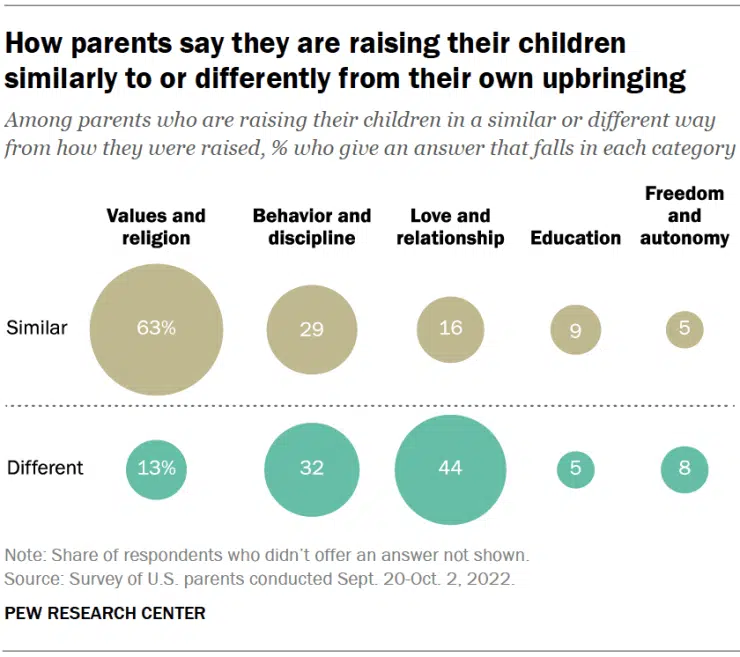
Gentle Parenting Vs. Traditional Parenting Statistics
9. In a survey about parenting, 29% of respondents are disciplining their children like their parents did, and 32% are diverging from their parents on this issue. (source)
10. 44% of “Gentle Parenting” parents have a love-based relationship with their children as opposed to 16% of “Traditional parenting” parents. (source)
11. Nearly nine out of ten (88%) say their parenting style differs from how they were raised, and three out of four (73%) think they are better parents than their parents. (source)
12. 73% of millennial parents assert that their parenting approach is better than previous generations. (source)
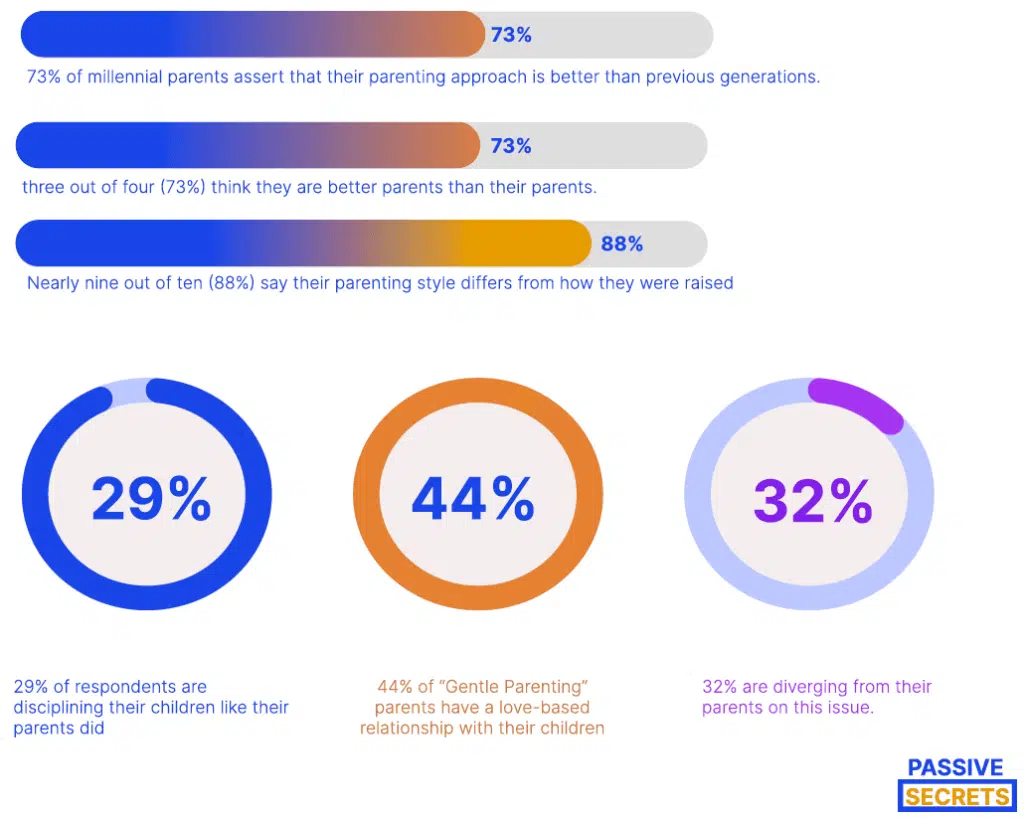
13. A study published in the Journal of Experimental Child Psychology found that parents who showed mild encouragement to their shy toddlers reduced their risk of anxiety. (source)
14. A quick search on TikTok yields hundreds of videos with 1.2 billion views offering advice, recommendations, and real-life instances of gentle parenting. (source)
15. 43% of parents claim to raise their children similarly to how they were raised, while 44% try a different approach. (source)
16. Research indicates that gentle parenting correlates with improved child social and emotional development. (source)
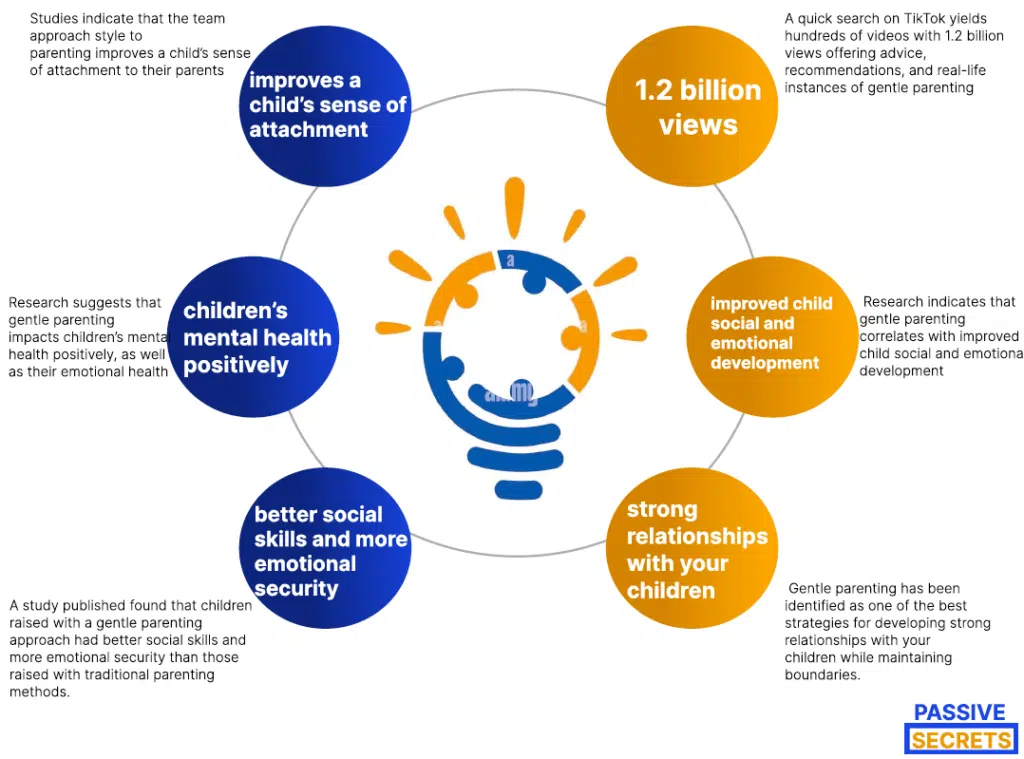
17. The four elements of gentle parenting are empathy, understanding, healthy boundaries, and respect. (source)
18. According to a study, gentle parenting “may promote regulated responses in social contexts in shy toddlers.” (source)
19. Although gentle parenting is positive, it does have some negative effects. Over 40% of people who practice gentle parenting were frequently fatigued, unsure, harsh on themselves, and lonely. (source)
20. 78% of parents say they are open to adopting gentle parenting this year, 2024. However, 47% want to be more intentional with disciplining their kids. (source)
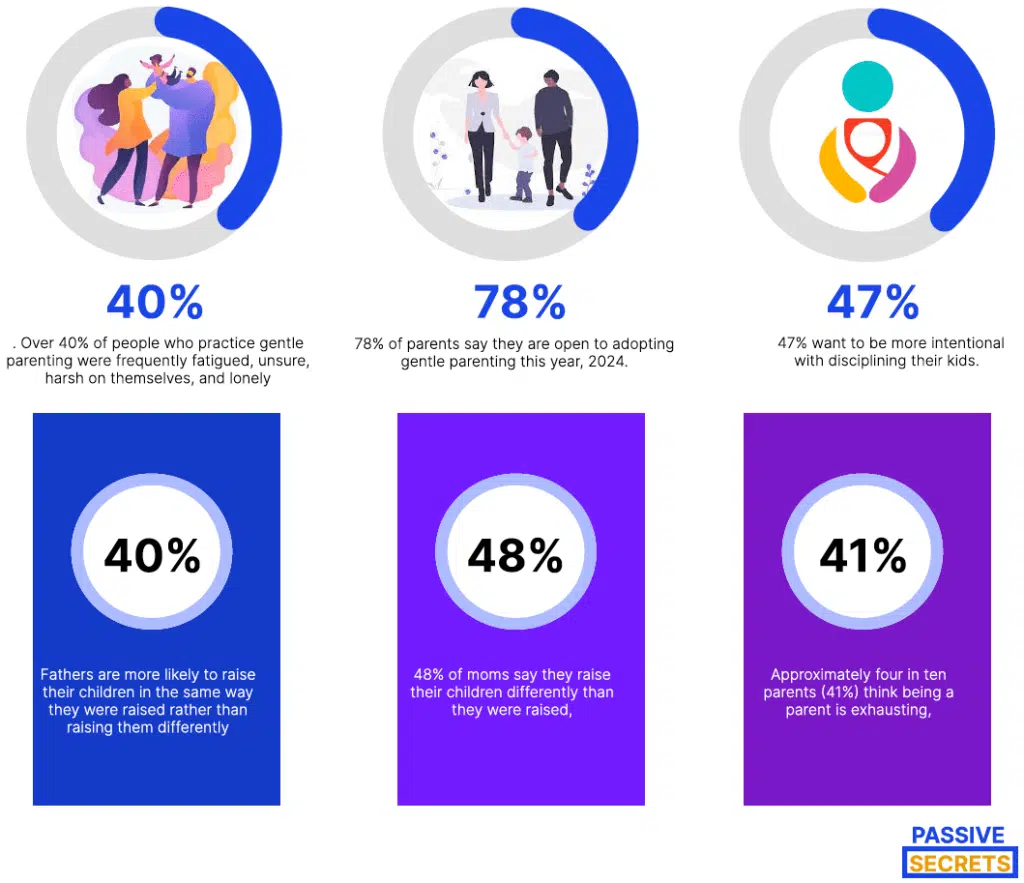
21. Gentle parenting has been identified as one of the best strategies for developing strong relationships with your children while maintaining boundaries. (source)
22. Research shows that positive parent-child relationships result in children who can grow into happy, independent, and resilient people. (source)
23. According to a theory, a gently-parented kid learns to identify and manage her emotions because her caregiver regularly affirms them as meaningful and genuine. (source)
24. A study published found that children raised with a gentle parenting approach had better social skills and more emotional security than those raised with traditional parenting methods. (source)
25. Fathers are more likely to raise their children in the same way they were raised rather than raising them differently (40%). (source)
26. 48% of moms say they raise their children differently than they were raised, while 40% say they are trying to raise them similarly. (source)
27. Approximately four in ten parents (41%) think being a parent is exhausting, while 29% say it is stressful all or most of the time. (source)
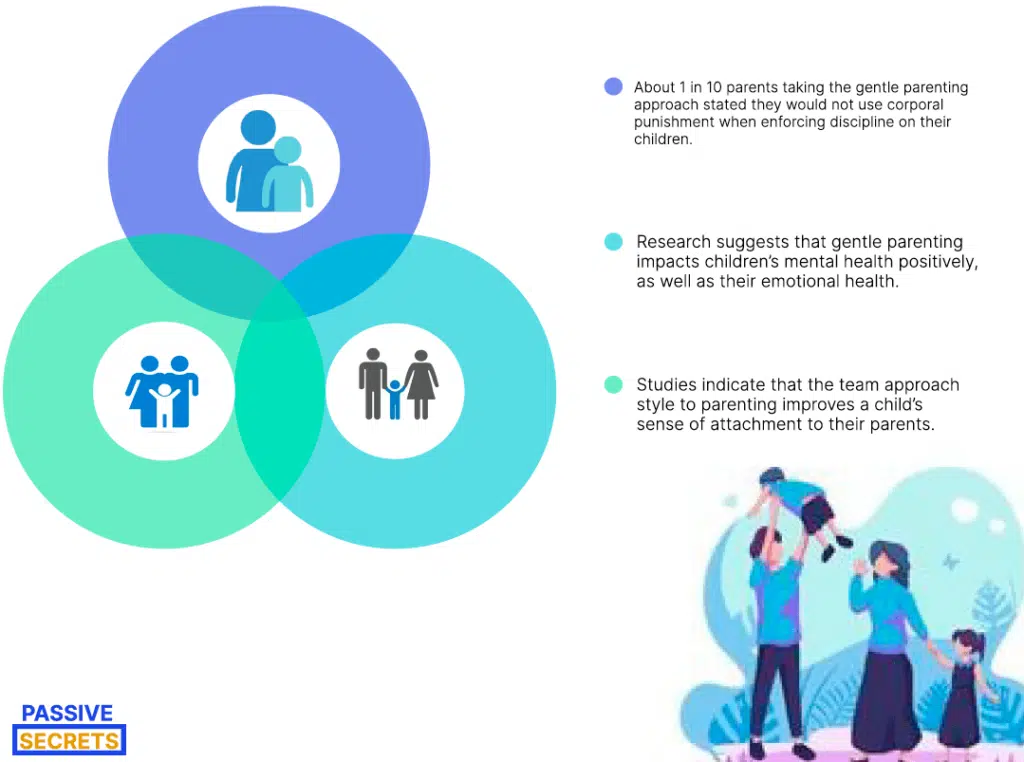
28. About 1 in 10 parents taking the gentle parenting approach stated they would not use corporal punishment when enforcing discipline on their children. (source)
29. Research suggests that gentle parenting impacts children’s mental health positively, as well as their emotional health. (source)
30. Studies indicate that the team approach style to parenting improves a child’s sense of attachment to their parents. (source)
31. 46% of parents in America say the gentle parenting style is effective. However, the same percentage disagree, believing it to be ineffective. (source)
32. Parents who have at least one child under the age of 18 are more likely to believe that gentle parenting is effective than parents who have at least one child 18 or older or Americans who have never been parents. (source)
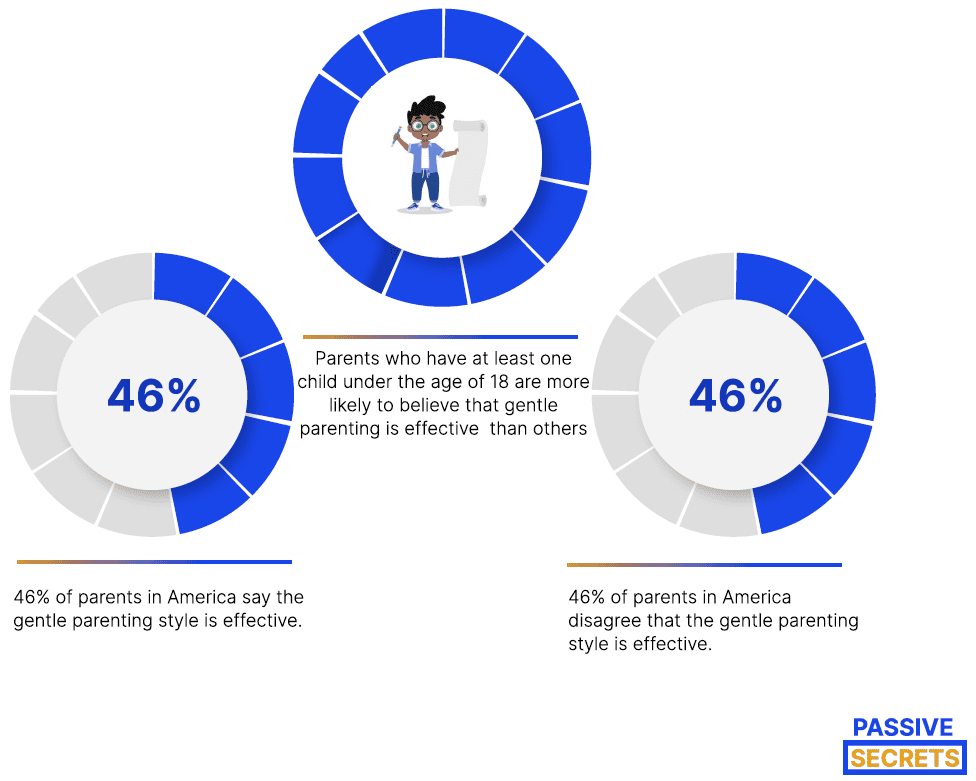
Frequently Asked Questions
1. What are the Benefits of Gentle Parenting?
Gentle parenting strengthens the link between parents and children, encouraging empathy, understanding, and respect. It also helps youngsters develop emotional intelligence and problem-solving skills by recognizing and responding to their specific needs. Gentle parenting can lower the chances of a child developing childhood anxiety and social anxiety.u003cbru003eParents use this approach to encourage their children to handle circumstances differently. A gentle parenting style can teach youngsters how to share and govern themselves in socially demanding situations.
2. Who Founded Gentle Parenting?
Sarah Ockwell-Smith, a psychologist and parenting specialist, is credited with introducing the concept of gentle parenting to the globe. She has written 13 parenting books based on the gentle philosophy. Although Ockwell-Smith is not a paediatrician or a neuroscientist, she does have four children of her own. This makes her qualified to give parenting advice from an expert point of view.
3. Is Gentle Parenting for Everyone?
The gentle parenting strategy is not for everyone. This is because it needs a great deal of patience, determination, and practice. This tactic may be tough to execute if you did not grow up in this manner and/or if your child is unfamiliar with this approach. Many parents say gentle parenting does not work for their child or household. Research shows gentle parenting practices may not be effective for every situation or child. Researchers discovered that gentle parenting strategies are less helpful for more serious challenging conduct, such as aggression, or for children who are more defiant to handle.
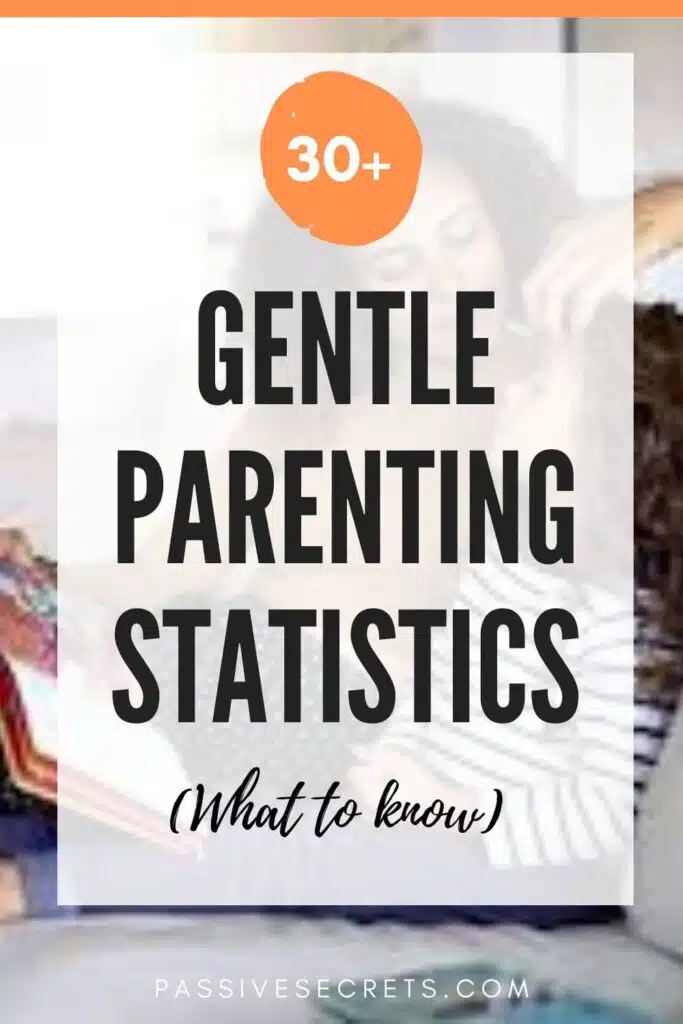
Related Posts:
- Thought-Provoking Gender Inequality Statistics: 160+ Insights Across Regions
- 110+ Shocking Income Inequality Data You Need to Know
- 50 Interesting Sharing Economy Statistics You Need to Know
- 100+ Animation Statistics: The Ultimate Guide To The Industry’s Trends and Insights
- 80+ Franchise Statistics and Facts You Should Know In 2024
- The Future of Learning: 50+ Top EdTech Statistics For 2024
- The Web3 Statistics Report 2024: Trends, Insights, and Predictions
- Meme Statistics 2024: Facts, Trends, and Figures That Will Blow Your Mind
- 85+ MOST Interesting Anime Statistics and Facts (NEW Report)
- Board Game Statistics: Revenue, Market Size, Demographics & More
- 125+ Interesting Airbnb Statistics by Country (Deep Insights)
- 50+ Interesting Born Into Poverty Stay In Poverty Statistics
- 90+ Interesting Film Industry Statistics (NEW Report)
- 80+ Alarming Technology Addiction Statistics You Must Know
- 65+ Impressive Chess Statistics and Facts To Know in 2024
- Spotify Statistics: Latest Report on The Music Streaming Platform
- 50+ Useful Video Game Addiction Statistics, Facts & Huge Trends
- 50+ Vital Internet Safety Statistics & Facts You Must Know
- Internet Dangers Statistics: A Look At The Internet’s Dark Side
- 50 Interesting Bible Statistics and Facts You Didn’t Know
- 95+ Interesting Dream Statistics and Facts You Can’t Miss
- 75+ Interesting Relationship Statistics & Facts You Should Know
- Dance Statistics: A Deep Dive Into The Rhythm Of Movement
- 40+ Incredible Single Father Statistics You Have to Know
- The Battle of the Sexes: Male Vs. Female Spending Statistics
- 95+ Jaw-Dropping Period Poverty Statistics You Need To Know
- 70 Exciting Love Statistics And Facts (True Love, Intimacy, Marriage, Dating & Relationships)
- 55+ Useful Black Consumer Spending Statistics (2024 Report)
- Holiday Spending Statistics: Valentine’s Day, Easter, Thanksgiving, & Christmas
